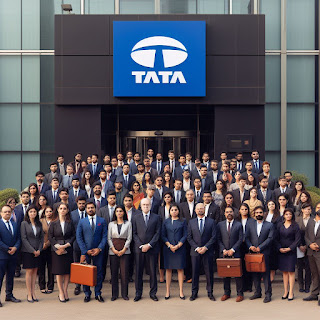The Tata Group is a global conglomerate headquartered in Mumbai, India. It is one of the largest and most respected conglomerates in the world, with operations in over 100 countries and a combined market capitalization of over $300 billion.
The Tata Group was founded in 1868 by Jamsetji Tata, a visionary entrepreneur who believed that businesses should have a social purpose. Tata was a pioneer in many industries, and he established several companies that played a key role in India's industrialization and economic development.
Today, the Tata Group is a diversified conglomerate with interests in a wide range of industries, including:
Automotive
Chemicals
Consumer products
Energy
Engineering
Financial services
Healthcare
Hospitality
Information technology
Infrastructure
Materials
Telecom
The Tata Group is known for its commitment to excellence, innovation, and sustainability. The group's companies are leaders in their respective industries, and the Tata brand is synonymous with trust and reliability.
Tata Group's Legacy of Trust
The Tata Group has a long history of philanthropy and social responsibility. The group's founder, Jamsetji Tata, believed that businesses should have a social purpose, and he instilled this value in the Tata Group's culture.
The Tata Group has established several charitable foundations and trusts that support a wide range of social causes, including education, healthcare, and poverty alleviation. The group's companies also have their own social responsibility initiatives, many of which are focused on sustainable development.
The Tata Group's commitment to trust and social responsibility has earned it the respect of its stakeholders and the public alike. The group is consistently ranked as one of the most trusted brands in India and the world.
Tata Group's Global Presence
The Tata Group has a global presence in over 100 countries. The group's companies operate in a wide range of industries, and they employ over 750,000 people worldwide.
The Tata Group's global presence gives it a unique advantage in the global marketplace. The group is able to leverage its global network to tap into new markets, develop new products and services, and source raw materials at competitive prices.
Tata Group's Commitment to Innovation
The Tata Group is committed to innovation. The group's companies invest heavily in research and development, and they are constantly looking for new ways to improve their products and services.
The Tata Group has a long history of innovation. In 1910, the Tata Group established India's first research institute, the Indian Institute of Science. The group's companies have also developed a number of innovative products and services, such as the Tata Nano car, the Tata Tea Tetley tea brand, and the Tata Consultancy Services IT consulting company.
Tata Group's Sustainability Focus
The Tata Group is committed to sustainability. The group's companies have set ambitious targets to reduce their environmental impact and promote sustainable development.
The Tata Group is investing heavily in renewable energy and energy efficiency. The group is also working to reduce its carbon emissions and water consumption. In addition, the Tata Group is supporting sustainable agriculture and forestry practices.
Tata Group's Future Outlook
The Tata Group is well-positioned for future growth. The group has a strong global presence, a commitment to innovation, and a focus on sustainability.
The Tata Group is also investing heavily in new technologies, such as artificial intelligence, big data, and the Internet of Things. These investments will help the group to maintain its competitive advantage in the global marketplace.
Conclusion
The Tata Group is a global leader with a legacy of trust. The group is committed to excellence, innovation, and sustainability. The Tata Group is well-positioned for future growth, and it is sure to continue to be a major player in the global marketplace.

Comments
Post a Comment